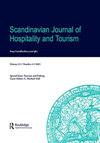免费导游:讲故事作为一种让城市地方全球化的方式
IF 3.6
4区 管理学
Q2 HOSPITALITY, LEISURE, SPORT & TOURISM
Scandinavian Journal of Hospitality and Tourism
Pub Date : 2020-05-26
DOI:10.1080/15022250.2020.1772866
引用次数: 10
摘要
摘要这篇文章提出了一个问题,讲故事是如何在免费导游中发生的。它旨在探索导游对城市地方全球化的贡献。从理论上讲,这项研究偏离了全球化、地点和讲故事的概念。从经验上讲,它建立在哥本哈根、柏林、华沙和塔林的数据基础上,这些数据是通过参与者观察和文献研究收集的。研究结果表明,在免费导游中讲故事是基于20世纪公认的叙事。这些反过来又与当地城市和国家历史有关。同样,讲故事也受到免费导游作为一种国际商业模式所形成的全球影响。这些指南体现了全球影响,其传记强调了他们作为旅行者的国际经历。他们的指导实践对历史实践有着强烈的影响。他们有能力选择景点、动作和故事。最终,出现了新形式的指导实践和讲故事。其中的重要因素包括:合作商业模式、国际经验丰富的导游、客人以前的知识以及城市的当地环境。这些做法结合了当地环境和世界文化,从而有助于城市地方的全球化。本文章由计算机程序翻译,如有差异,请以英文原文为准。
Free guided tours: storytelling as a means of glocalizing urban places
ABSTRACT This article poses the question of how storytelling takes place in free guided tours. It aims to explore guides’ contributions to the glocalization of urban places. Theoretically, the study departs from the concepts of glocalization, place, and storytelling. Empirically, it builds on data from Copenhagen, Berlin, Warsaw and Tallinn, collected by means of participant observations and document studies. Results show that storytelling in free guided tours is based on recognizable narratives from the twentieth century. These in turn, relate both to local urban and to national histories. Likewise, storytelling is influenced by global influences formed by free guided tours as an international business model. Global influences are embodied in the guides, whose biographies accentuate their international experience as travellers. Their guiding practices have a strong influence on the practice of history. They have the power to choose attractions, movements, and stories. In the end, new forms of guiding practices and storytelling emerge. Important factors for this are: the collaborative business model, internationally experienced guides, guests’ previous knowledge, and the cities’ local context. The practices combine local context and cosmopolitan culture and thereby contribute to the glocalization of urban places.
求助全文
通过发布文献求助,成功后即可免费获取论文全文。
去求助
来源期刊
CiteScore
7.90
自引率
8.30%
发文量
14
期刊介绍:
Scandinavian Journal of Hospitality and Tourism is the leading Nordic journal for hospitality and tourism research. SJHT aims at initiating and stimulating high-impact and innovative research relevant for academics and practitioners within the hospitality and tourism industries. The journal takes an interdisciplinary approach including, but not limited to geography, psychology, sociology, history, anthropology, and economics. SJHT encourages research based on a variety of methods, including both qualitative and quantitative approaches. The journal covers all types of articles relevant to the Nordic region, as well as the North Atlantic, North Sea and Baltic regions. We also welcome reviews and conceptual articles with a broader geographical scope that clearly enhance the theoretical development of the hospitality and tourism field. In addition to research articles, we welcome research notes and book reviews. Published articles are the result of anonymous reviews by at least two referees chosen by the editors for their specialist knowledge.

 求助内容:
求助内容: 应助结果提醒方式:
应助结果提醒方式:


